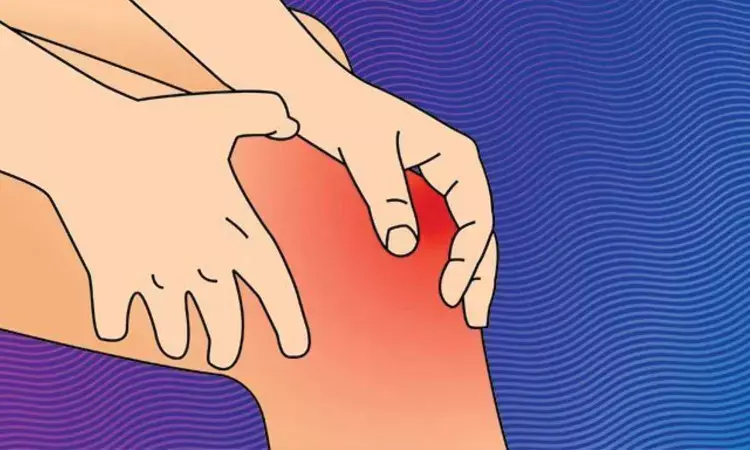- Home
- Medical news & Guidelines
- Anesthesiology
- Cardiology and CTVS
- Critical Care
- Dentistry
- Dermatology
- Diabetes and Endocrinology
- ENT
- Gastroenterology
- Medicine
- Nephrology
- Neurology
- Obstretics-Gynaecology
- Oncology
- Ophthalmology
- Orthopaedics
- Pediatrics-Neonatology
- Psychiatry
- Pulmonology
- Radiology
- Surgery
- Urology
- Laboratory Medicine
- Diet
- Nursing
- Paramedical
- Physiotherapy
- Health news
- Fact Check
- Bone Health Fact Check
- Brain Health Fact Check
- Cancer Related Fact Check
- Child Care Fact Check
- Dental and oral health fact check
- Diabetes and metabolic health fact check
- Diet and Nutrition Fact Check
- Eye and ENT Care Fact Check
- Fitness fact check
- Gut health fact check
- Heart health fact check
- Kidney health fact check
- Medical education fact check
- Men's health fact check
- Respiratory fact check
- Skin and hair care fact check
- Vaccine and Immunization fact check
- Women's health fact check
- AYUSH
- State News
- Andaman and Nicobar Islands
- Andhra Pradesh
- Arunachal Pradesh
- Assam
- Bihar
- Chandigarh
- Chattisgarh
- Dadra and Nagar Haveli
- Daman and Diu
- Delhi
- Goa
- Gujarat
- Haryana
- Himachal Pradesh
- Jammu & Kashmir
- Jharkhand
- Karnataka
- Kerala
- Ladakh
- Lakshadweep
- Madhya Pradesh
- Maharashtra
- Manipur
- Meghalaya
- Mizoram
- Nagaland
- Odisha
- Puducherry
- Punjab
- Rajasthan
- Sikkim
- Tamil Nadu
- Telangana
- Tripura
- Uttar Pradesh
- Uttrakhand
- West Bengal
- Medical Education
- Industry
Patients with high fasting blood sugar at risk of worse knee osteoarthritis symptoms

Patients with high fasting blood sugar at risk for worse knee osteoarthritis symptoms suggests a recent study published in the Arthritis Research & Therapy
They evaluated the longitudinal relationship between serum blood glucose and knee symptoms by dividing the cohort of patients with KOA into those with and without CS. We hypothesized that higher serum blood glucose levels would worsen knee symptoms. A total of 297 participants (mean age: 59.6 years; females: 211; average BMI: 23.7 kg/m2) were enrolled in this study. At baseline, plain radiographs of the bilateral knee joints were evaluated according to the Kellgren–Lawrence grade (KLG). All participants exhibited at least a KLG ≥ 2 in each knee. At baseline, fasting blood glucose (FBG) and Central Sensitization Inventory-9 (CSI-9) were evaluated; ≥ 10 points on the CSI-9 was defined as CS+. Knee injury and Osteoarthritis Outcome Score (KOOS) was evaluated at baseline and at 1-year follow-up; the change in KOOS (ΔKOOS) was calculated by subtracting the KOOS at baseline from that at the 1-year follow-up. Multiple linear regression analysis was conducted with ΔKOOS as the dependent variable and FBG at baseline as the independent variable, adjusted for age, sex, BMI, and CSI-9 at baseline.
Results
Of the 297 subjects, 48 (16.2 %) were defined as CS+. In the CS − group, there was no association between FBG levels at baseline and ΔKOOS. In contrast, FBG at baseline was negatively associated with ΔKOOS pain, ADL, and sports.
In patients with radiographic KOA and CS, higher blood glucose levels were associated with deteriorated knee symptoms during the 1-year follow-up. Healthcare providers should pay attention to controlling blood glucose, particularly in patients with KOA and concurrent CS, to mitigate their knee symptoms.
Reference:
Chiba, D., Ohyama, T., Sasaki, E. et al. Higher fasting blood glucose worsens knee symptoms in patients with radiographic knee osteoarthritis and comorbid central sensitization: an Iwaki cohort study. Arthritis Res Ther 24, 269 (2022). https://doi.org/10.1186/s13075-022-02951-2
Dr. Shravani Dali has completed her BDS from Pravara institute of medical sciences, loni. Following which she extensively worked in the healthcare sector for 2+ years. She has been actively involved in writing blogs in field of health and wellness. Currently she is pursuing her Masters of public health-health administration from Tata institute of social sciences. She can be contacted at editorial@medicaldialogues.in.
Dr Kamal Kant Kohli-MBBS, DTCD- a chest specialist with more than 30 years of practice and a flair for writing clinical articles, Dr Kamal Kant Kohli joined Medical Dialogues as a Chief Editor of Medical News. Besides writing articles, as an editor, he proofreads and verifies all the medical content published on Medical Dialogues including those coming from journals, studies,medical conferences,guidelines etc. Email: drkohli@medicaldialogues.in. Contact no. 011-43720751


